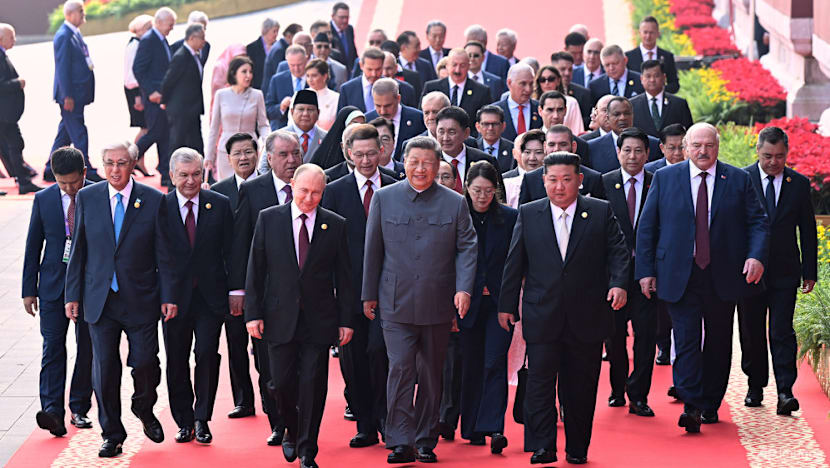Politics
Xi Jinping Unveils Global Governance Initiative to Reshape Order

Chinese President Xi Jinping has introduced a new framework for global governance reform, signalling a strategic effort by Beijing to influence the future of international relations. The Global Governance Initiative (GGI) was unveiled during a summit of the Shanghai Cooperation Organization (SCO) on September 1, 2023, in Tianjin. This initiative aims to foster collaboration among nations towards a more equitable governance system, amid a backdrop of rising geopolitical tensions and shifting alliances.
In his keynote address, Xi drew parallels between today’s global challenges and the aftermath of the world wars, which led to the establishment of the United Nations 80 years ago. He emphasized the need for countries to unite against “Cold War thinking, hegemonism, and protectionism,” which he believes continue to hinder progress. “History tells us that the more difficult the times, the more we must hold fast to the aspiration of peaceful coexistence,” Xi stated, framing the GGI as a call to action for a fair and reasonable international framework.
Analysts suggest that the GGI reflects China’s ambition to reshape the international order, positioning itself as a leader among developing nations. Zachary Abuza, an expert in Asian geopolitics, noted that this initiative could be a response to perceived weaknesses within China, including economic challenges and demographic issues, rather than a purely strategic move based on strength.
Xi’s address at the summit highlighted five guiding principles of the GGI, which include sovereign equality, respect for international law, multilateralism, prioritizing people, and an action-oriented approach. These principles serve as a roadmap for what China envisions for global governance, aiming to address perceived imbalances in the current system.
China’s Vision for Multilateralism
The Global Governance Initiative is built on a foundation of prior proposals from Xi, including the Global Development Initiative and the Global Security Initiative. Each of these initiatives has sought to promote a multipolar world order that emphasizes the perspectives of developing countries, often referred to collectively as the Global South.
China asserts that over 100 countries and international organizations have expressed support for its development initiatives, and the GGI aims to refine these earlier concepts into a cohesive strategy. Xi’s historical references during his speech also serve to position China as a defender of peace and a shaper of a new global order, contrasting its approach with that of the United States.
The initiative’s reception among other countries, particularly those in the Global South, may vary. While some may view China’s proposals as an opportunity for greater representation in global governance, others remain cautious of Beijing’s motives. The landscape of international relations is complex, and the diverse interests of developing nations complicate universal acceptance of China’s leadership.
Challenges Ahead for Implementation
Despite the ambitious rhetoric, analysts point out significant gaps between Xi’s vision and the practical steps needed for implementation. There remains uncertainty about how China plans to translate the GGI’s principles into concrete actions and commitments. The initiative has not specified the resources or mechanisms that will be employed to achieve its goals.
Moreover, perceived contradictions in China’s foreign policy may undermine its credibility. For instance, Xi’s close ties with Russia and North Korea raise questions about China’s commitment to international law, especially considering ongoing disputes in the South China Sea. The 2016 ruling by the Permanent Court of Arbitration, which invalidated China’s extensive territorial claims, continues to be a contentious issue, with China rejecting the court’s authority.
As China endeavors to promote its governance model through the SCO, which has expanded to include various member states with differing political systems, the initiative’s effectiveness may be limited by internal factionalism and external skepticism. Jonathan Ping, an associate professor at Bond University, noted that the SCO’s ability to lead global governance reform could be constrained by its diverse membership and competing interests.
Ultimately, the Global Governance Initiative represents China’s attempt to present itself as a reformer of the international system while advocating for a voice for the Global South. The initiative’s true impact will depend on how well China can navigate both domestic challenges and international perceptions as it seeks to translate its vision into reality.
As the geopolitical landscape continues to evolve, the GGI offers a glimpse into China’s aspirations for a new world order, one that seeks to redefine global governance in a manner that aligns with its strategic interests.
-

 World5 months ago
World5 months agoSouth Korea’s Foreign Minister Cho Hyun to Visit China This Week
-

 Business5 months ago
Business5 months agoStarling Bank Plans Secondary Share Sale, Targeting $5.4 Billion Valuation
-

 Top Stories5 months ago
Top Stories5 months agoMunsang College Celebrates 100 Years with Grand Ceremony
-

 World5 months ago
World5 months agoPAS Aims to Expand Parliamentary Influence in Upcoming Election
-

 Business7 months ago
Business7 months agoKenvue Dismisses CEO Thibaut Mongon as Strategic Review Advances
-

 Lifestyle6 months ago
Lifestyle6 months agoHumanism Camp Engages 250 Youths in Summer Fest 2025
-

 Sports6 months ago
Sports6 months agoDe Minaur Triumphs at Washington Open After Thrilling Comeback
-

 Sports7 months ago
Sports7 months agoTupou and Daugunu Join First Nations Squad for Lions Clash
-

 Top Stories7 months ago
Top Stories7 months agoColombian Senator Miguel Uribe Shows Signs of Recovery After Attack
-

 World7 months ago
World7 months agoASEAN Gears Up for Historic Joint Meeting of Foreign and Economic Ministers
-

 Health6 months ago
Health6 months agoNew Study Challenges Assumptions About Aging and Inflammation
-

 Business7 months ago
Business7 months agoOil Prices Surge Following New EU Sanctions on Russia









